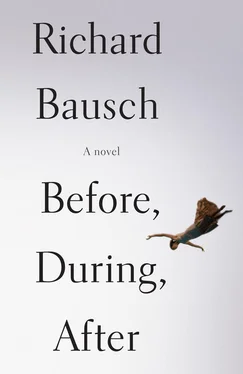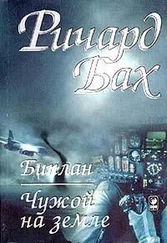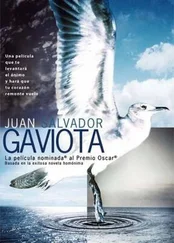“I’m very frightened,” she said. “Aren’t you very frightened?”
Natasha walked on toward the beach. People were sitting on blankets in the sand, some with coolers and wine, as though nothing at all had happened and this was just the fine weather of cloudy twilight by the sea. One small circle had lit a hibachi. They were speaking Spanish and what sounded like German. It could not matter as much to those for whom America was not home. That was just life on earth. Two girls tossed a beach ball back and forth, and another was trying to make a figure in the sand. Still another walked among the patrons with a little tray of beer. Natasha stood at the water’s edge and looked toward the hills, then toward the open sea. People splashed and moved with the water a few hundred paces up that way. They were all shadows in the failing light.
Someone was playing a guitar back toward the entrance of the resort. Someone else was hitting bongos. She heard the sound of a metal drum, too. It was almost full dark.
She made her way back to the wide veranda, and standing there, staring out, was Constance.
“Where have you been?” Constance wanted to know.
“I was just looking for you.”
“Is this your friend?” Mrs. Skinner asked from her chair. Ratzi was still sitting in his own chair, hands on his knees, his gaze darting from one to the other of them.
Natasha addressed Constance under her breath. “Where’s Skinner?” To her surprise, she had to resist a manic urge to laugh.
“Who?”
“Mr. Skinner. Mr. Skinner — the one you walked down to the beach with.”
“Why, hon-eh love,” Constance said, running the syllables together. “I been down th’ beach with two ’r three types this terrible day. Getting in the water and trying to get sober.”
Mr. Skinner’s wife got out of the chair and moved to face her. “You listen. His name is Skinner. He’s an alcoholic, he cheats , and he can’t have anything to drink.”
“Don’t you know what’s happ’nin’, hon-eh?” Constance said. “Ev’body’s drinkin’ t’day, sweetie. Ev’body. Whole world came down on us like a ton today. We don’ even know how many’s lost their lives today.”
“His name happens to be Walter B. Skinner. He’s in need of help.”
“Walt. Oh, yeah — okay. Him. Skinner. Walt. How could I not remember Walt.” She laughed into her fist. “You know — seriously, if yer innerested I–I ran into him jus’ now. Jus’ left’m in the bar. I swear he’s in there. Good man, ol’ Walt. He got a lil’ sunburned. And, hon-eh, I gotta tell ya, he’s been drinking.”
Mrs. Skinner turned and hurried into the building, through the crowd that was still in the lobby.
“Guy’s three sheets,” Constance said. “Very in-ee-briated man. She’s gonna be mad as hell when she gets to him.”
Natasha said nothing, trying to keep from collapsing with laughter or crying — it felt like a form of psychosis — and she leaned into Constance, bracing herself against the pressure of the whole day.
“Hey,” Constance said. “You look like you’re about to fall down.”
“No,” Natasha told her. “I want another whiskey.”
“I do believe in God,” Ratzi said. “But not like that.”
“I don’ think God cares about us at all,” Constance muttered, mostly to herself. “All we do ev’ry goddamned day is kill ’n’ maim ’n’ starve ’n’ butcher ’n’ fillet ’n’ cook each other.”
“Where were you all day?” Natasha asked.
Constance seemed not to have heard. But then she said, tearfully, “Been tryin’ t’contact my daughter.” She rubbed her eyes vigorously and seemed to let down with a sigh, her hands dropping to her sides. “Well — ev’body’s unhappy. I’m gon’ go t’bed. You go too.”
“Do you need help?” Natasha asked.
But the other didn’t answer, pausing long enough to stare at Ratzi, half wave at him, and then move toward the entrance. Natasha saw sand on her back.
“Nice lady,” Ratzi said. “It’s so sad for everyone today.”
She nodded, then turned and followed her friend into the lobby. Constance had paused. There was commotion in the bar, several people standing around someone on the floor near the waiters’ station. Skinner. A group of men had crouched side by side around him. They lifted him — it took four of them — and moved falteringly to the long couch against the wall. Mrs. Skinner stood by with her hands clasped over her middle, muttering to herself. And here was Ratzi hurrying in, with two members of the waitstaff. Skinner’s head moved, but his eyes were nearly shut, and you could see he was only half conscious. Someone said an ambulance was on the way, and in a little while they all heard the siren. People were coming in from the veranda and the beach, and the paramedics moved through without looking to the left or right. They got to Skinner and started working over him while his wife stood closer, sniffling and saying to anyone who would listen that she had warned him, she had told him what was going to happen if he kept on. Now God had given his sign.
“Hope he’ll be all right,” Constance said. She fixed Natasha with a stony look. “I’m not as drunk as you think.”
“Oh, what can it matter?” Natasha said to her.
“Well, I’m quite drunk enough, though. But look at ’m. He’s just passed out. Pissed, as they say.”
The medics got Skinner onto a stretcher and took him out of the place. He was more alert now, eyes open, taking people in as he was carried past them. Natasha looked around for Mrs. Skinner but could no longer see her. “Where did the wife go?” she asked Constance, who was moving unsteadily toward the elevators.
“Got on her broom and rode away, I guess.”
They stood by the elevators, Constance leaning on the wall there, head down, pale and clearly tired. The elevator door opened, and she got on, put her hands on the small faux-wooden railing inside, then turned and looked bleakly out. There was no recognition in her face, no sense that she saw anything or anyone.
“Remember,” she said gravely. “They don’t allow tourists in th’ place b’fore nine-thirty.” The doors closed on her.
7
Natasha returned to the beach. The moon shining through a hole in the clouds made shadows of the palms. There were no planes in the sky, and though the palm fronds clicked when the breezes moved them, the quiet seemed deeper. The sea shimmered under the silver light, and she saw the silhouette of a passing ship out on the horizon, making its way east, probably with cargo. There was a faintly glimmering flash of movement in the water. Something jumped, and jumped again. A school of porpoises was swimming by, phosphorescence flickering in their wake. She had a moment of knowing that Faulk was safe wherever he was. Near the water she sat down on the damp, packed sand, supporting herself with both hands. So many people were suffering across the miles of darkness. The thought of her dead parents came to her, gone before she could have any memory of them, two young people in love, planning to have several children — according to Iris, they had wanted a large family — and the world had taken them. And now she could not unthink the possibility that this feeling of relief about Faulk was a great irony, and that the world had already taken him as well. She began to entreat the sea and sky, murmuring the words, “Please let it be all right.” And the loss of her parents seemed mingled with this badness, all part of the same pitiless chance. Everything was exaggerated by the fact that she could not find out, could not know for certain. And even as she recognized the morbid indulgence of the fear, it raked through her. She could not change it or make it stop. Because what if he really was gone? All that fire and falling debris, and why could she not get through to him?
Читать дальше












